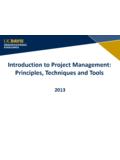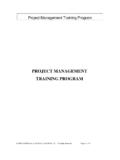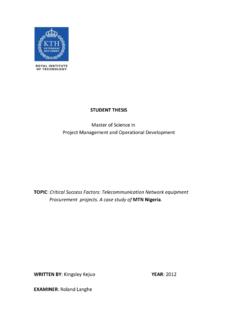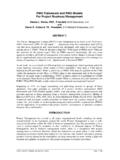Transcription of Intro to Project Management
1 1 An Introduction to Project Management The purpose of this briefing paper is to introduce key Project Management terms and concepts to provide a common language for discussion, including what is: A Project Project Management Project success A Project manager A Project Management plan Successful Project Management has several significant characteristics. To understand the value of Project Management , it is necessary to understand the fundamental nature of a Project ; the core characteristics of Project Management processes; how success is evaluated, the roles, responsibilities, and activities of a Project manager and the expertise required; and the context in which projects are performed, conceptually illustrated by figure Throughout this document, references are made to The Project Management Institute s (PMI ) Project Management Body of Knowledge (PMBOK ).
2 Developed over the past 30 years, the PMBOK is a collection and organization of knowledge on the Project Management profession. It is widely accepted to include the core elements of successful Project Management practices. It is a regularly updated and internationally referenced standard (ANSI /PMI 99-001-2004) and provides a basis for universal discourse on practices. Most modern 1 Project Management Institute. A Guide to the Project Management Body of Knowledge: PMBOK Guide, 3rd Edition. Newtown Square, Pennsylvania, Project Management Institute, 2004, p.
3 43. Figure 1. 2 academic and practical publications on the subject of Project Management reference the PMBOK, adopt its methodology, and incorporate its terminology. What Is a Project ? The fundamental nature of a Project is that it is a temporary endeavor undertaken to create a unique product, service, or result. 2 Projects are distinguished from operations and from programs. Temporary Endeavor To be temporary signifies that there is a discrete and definable commencement and conclusion; the Management of a Project requires tailored activities to support this characteristic, as such, a key indicator of Project success is how it performs against its schedule that is, does is start and end on time.
4 Unique Deliverable The uniqueness of the deliverable, whether it is a product, service, or result, requires a special approach in that there may not be a pre-existing blueprint for the Project s execution and there may not be a need to repeat the Project once it is completed. Uniqueness does not mean that there are not similarities to other projects, but that the scope for a particular Project has deliverables that must be produced within constraints, through risks, with specific resources, at a specific place, and within a certain period; therefore, the process to produce the deliverable as well as the deliverable itself is unique.
5 Progressive Elaboration This unique process and deliverable produces the third characteristic of a Project : progressive elaboration. Project Management is a group of interrelated processes, implemented in a progressively elaborative manner, in which to produce the deliverable. Progressive elaboration is the revealing and focusing of details through time. For example, in the engineering design process, a general and broad concept may be a starting point for the design team; but through the design process, the concept is narrowed to a specific scope and is further elaborated to achieve the completed design; moreover, it may continue to be elaborated and not be finalized until the product, service, or result is delivered.
6 Other Projects A clarification should be made with respect to Reclamation language. In Reclamation, a Project is typically a congressionally authorized or directed activity that allows Reclamation to do something specific. Traditionally, projects 2 Project Management Institute. A Guide to the Project Management Body of Knowledge: PMBOK Guide, 3rd Edition. Newtown Square, Pennsylvania, Project Management Institute, 2004, p. 5. 3 are groups of infrastructure, such as the Central Arizona Project , the Lower Colorado Dams Project , or the Central Valley Project .
7 The Reclamation Project activities would range from the traditional planning, designing, and building of structures, to negotiating and signing delivery contracts, developing operations plans, and completing environmental compliance In historic Reclamation vernacular, the operation and maintenance of the completed Project is also often considered as part of the Project . Additionally at times in Reclamation, the people managing projects are often referred to as something other than Project managers they may be called team leaders, coordinators, activity managers or program managers; people managing projects may be called area managers or facility managers.
8 Because of these connotations, care should be taken to distinguish between Reclamation projects and projects as defined above. A Project Versus an Operation The operations of an organization are continuing and repetitive activities that are executed to achieve its mission and sustain the business, but without a definable end to their performance and without a unique output that is, it is not produced or provided only once. A Project Versus a Program A Project differs from a program in that a program is a group of related projects managed in a coordinated way to obtain benefits and control not available from managing them individually.
9 Programs may include elements or related work outside the scope of discrete projects in the program. 4 Furthermore, programs often involve a series of repetitive or cyclical undertakings. In Reclamation, a program is typically a group of projects administered by Reclamation. Reclamation programs do not have to be specifically authorized, and a program s schedule may continue past any individual Project . Examples of Reclamation programs are the Safety of Dams Program, the RAX Program, and the Title 16 What Is Project Management ? Project Management is the process of the application of knowledge, skills, tools, and techniques to Project activities to meet Project requirements.
10 6 That is, Project Management is an interrelated group of processes that enables the Project 3 Carly, Lauren. Project Management Primer. Bureau of Reclamation, 2004, p. 2. 4 Project Management Institute. A Guide to the Project Management Body of Knowledge: PMBOK Guide, 3rd Edition. Newtown Square, Pennsylvania, Project Management Institute, 2004, p. 16. 5 Carly, Lauren. Project Management Primer. Bureau of Reclamation, 2004, p. 2. 6 Project Management Institute. A Guide to the Project Management Body of Knowledge: PMBOK Guide, 3rd Edition.



















